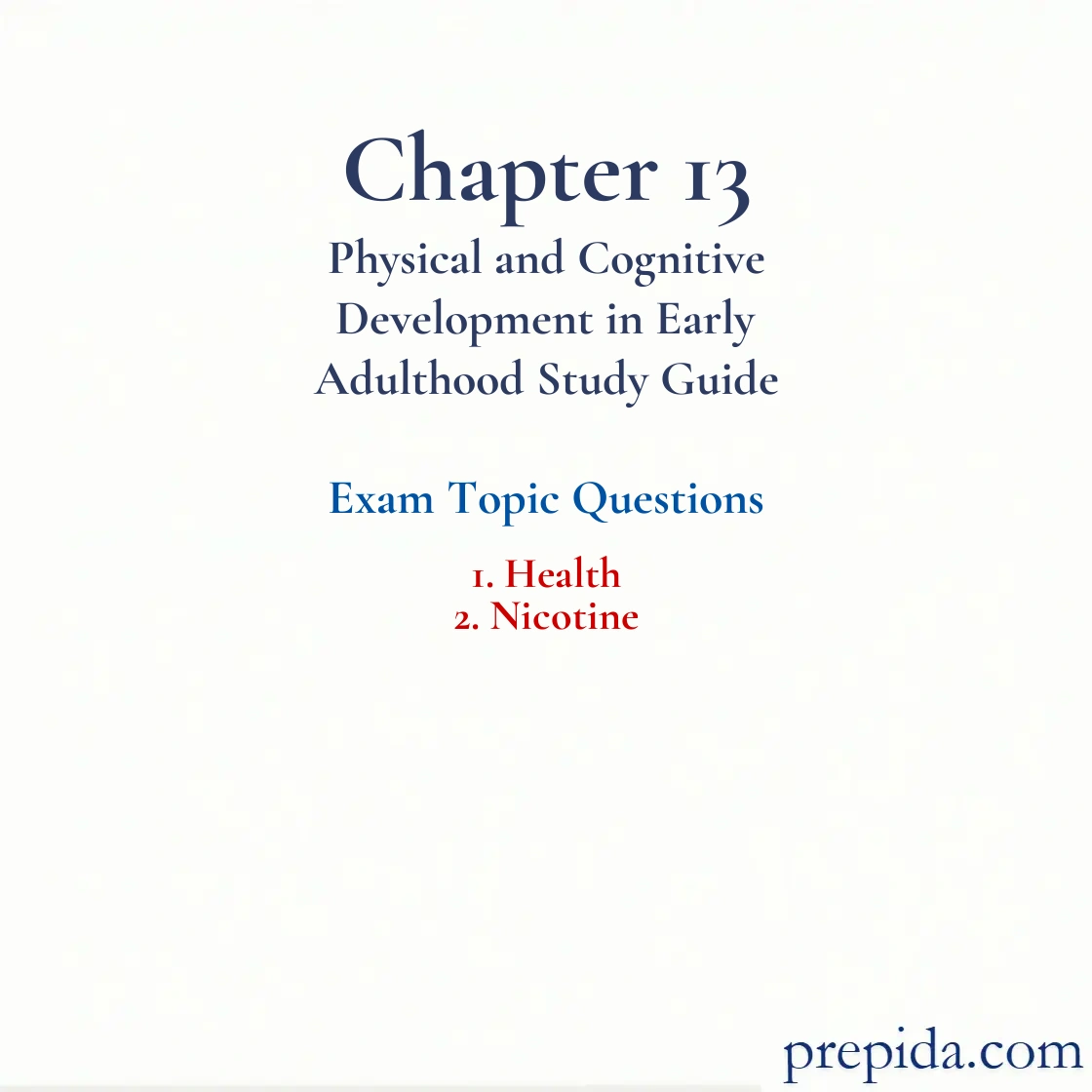
Mark, a 21-year-old, is a college student who plays basketball. He has represented his college in several nationwide basketball competitions. Mark has a healthy body mass index and is popular among his peers for his sturdy, muscular physique. What does Mark most likely do to improve and maintain his health profile?
- He follows a strict vegan diet.
- He engages in binge drinking.
- He gets adequate sleep.
- He has multiple sex partners.
Emerging adults fail to develop health-promoting habits because they
- believe that good genes will override any unhealthy behaviors.
- lack knowledge about which behaviors are healthy and unhealthy.
- are reluctant to be seen as health-conscious.
- do not consider how their lifestyle will affect them later in life.
Short-Term Memory: The memory component in which individuals retain information for up to 30 seconds, assuming there is no rehearsal of the information.
According to a recent study conducted by VanKim and Laska, college students from low-SES backgrounds ________ than their higher-SES counterparts did.
- engaged in higher levels of physical activity
- used unhealthy weight control methods
- ate more fruits and vegetables
- ate less fast food
A recent study conducted by VanKim and Laska revealed that college students from low-SES backgrounds ________ than their higher-SES counterparts.
- ate less fast food
- ate more fruits and vegetables
- controlled their weight better
- engaged in lower levels of physical activity
Aerobic Exercise: Sustained exercise (such as jogging, swimming, or cycling) that stimulates heart and lung activity.
According to the American Academy of Sleep Medicine and Sleep Research Society, which of the following statements is true about an individual's sleep?
- The level of stress is independent of the quality or amount of sleep.
- Family and social obligations predominantly lead to long hours of sleep in an individual's life.
- Usually five hours of sleep a day is necessary for the optimal performance of an individual.
- Chronic sleep deprivation may contribute to cardiovascular disease and a shortened life span.
Life Span: The maximum number of years an individual can live. The life span of human beings is about 120 to 125 years of age.
Which of the following is true of binge eating disorder (BED)?
- Adolescents with BED are more likely to live in families that function effectively.
- BED involves frequent binge eating with compensatory behavior like purging.
- BED is far more common in females than males.
- Individuals with BED are frequently underweight.
Binge Eating Disorder (BED): Involves frequent binge eating but without compensatory behavior like the purging that characterizes bulimics.
A recent study of college students from low-SES backgrounds and high-SES backgrounds conducted by VanKim and Laska showed that college students from low-SES backgrounds ________ than their higher-SES counterparts.
- ate more fast food and fewer fruits and vegetables
- showed more healthy weight control
- engaged in higher levels of physical activity
- had a more balanced diet
A longitudinal study by Harris and others revealed that most bad health habits that were engaged in during adolescence ________ in emerging adulthood.
- receded
- did not continue
- remained unchanged
- increased
Emerging Adulthood: The transition from adolescence to adulthood (occurring from approximately 18 to 25 years of age), which is characterized by experimentation and exploration.
In the context of health, which of the following statements is true of emerging adults?
- They have more than twice the mortality rate of adolescents.
- They are less likely to engage in health-compromising behaviors than adolescents.
- They are less likely to be obese or have a mental disorder than adolescents.
- They eat regular meals and avoid consuming snacks during the day.
Adolescent Egocentrism: The heightened self-consciousness of adolescents.
One of the most strongly supported interventions for binge eating disorder (BED) is ________.
- coherence therapy
- social therapy
- interpersonal therapy
- gene therapy
Binge Eating Disorder (BED): Involves frequent binge eating but without compensatory behavior like the purging that characterizes bulimics.
Nicotine is a
- depressant.
- stimulant.
- narcotic.
- sedative.
Which of the following statements is true about nicotine?
- It is a depressant that stimulates neurotransmitters that have a calming or pain-reducing effect.
- It increases the smoker's energy and alertness.
- It deprives the smoker of a pleasurable and reinforcing experience.
- It is a passive drug in cigarettes that reduces the dopamine levels of the smoker.
Aerobic Exercise: Sustained exercise (such as jogging, swimming, or cycling) that stimulates heart and lung activity.
________ stimulates neurotransmitters (especially dopamine) that have a calming or pain-reducing effect.
- A barbiturate
- Amphetamine
- Leptin
- Nicotine
Addiction: A pattern of behavior characterized by an overwhelming involvement with using a drug and a preoccupation with securing its supply.
Which of the following is the active drug in cigarettes?
- leptin
- barbiturate
- nicotine
- amphetamine
Addiction: A pattern of behavior characterized by an overwhelming involvement with using a drug and a preoccupation with securing its supply.